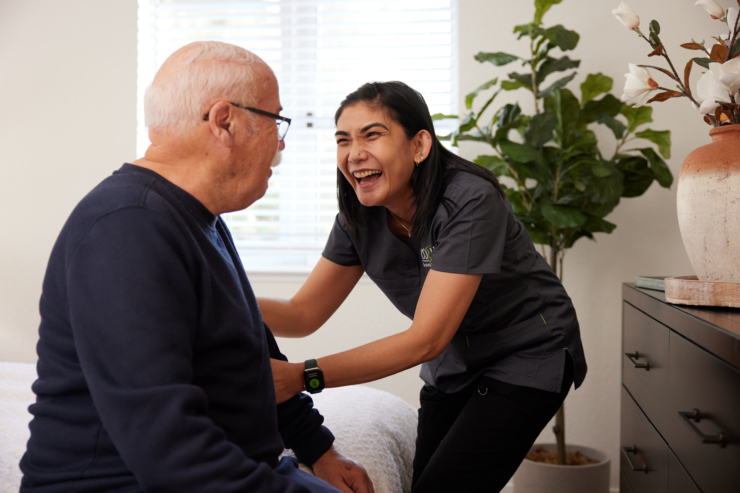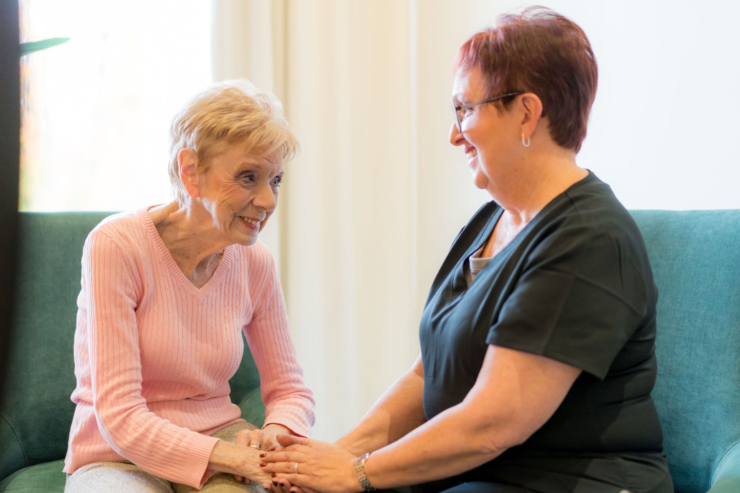
Understanding the Differences: Early Signs of Dementia vs. the First Signs of Alzheimer’s
Jack was an intelligent, disciplined man who stayed active well into retirement. He was the tennis champion of his retirement home and a kind soul loved by all who knew him. But near the end of his life, he experienced mild forgetfulness that turned into long periods of confusion. He did not know where he was despite living in an assisted living community for years. This once open-minded person treated unfamiliar doctors with paranoia and suspicion. However, when he had moments of lucidity between long periods of visual hallucinations, he was still the kind soul everyone knew and loved.
Jack had a form of dementia brought on by his late-stage Parkinson’s. Thankfully, assisted living memory care was able to mitigate his symptoms, improve his quality of life, and make the last few years of his life very comfortable. Nonetheless, it was difficult for his family to process.
“Dementia” and “Alzheimer’s” are often used interchangeably, but they are not the same. Both represent cognitive decline, share similar symptoms, and can be treated in assisted living memory care. However, dementia is an umbrella term for a grouping of symptoms. Alzheimer’s is a specific disease and the most prevalent type of dementia. Using them interchangeably can be confusing, especially among families trying to help loved ones through early signs of dementia.
In this blog, we’ll explore dementia and Alzheimer’s, their symptoms, causes, and available treatment. Unfortunately, there is no Alzheimer’s disease cure, nor is there a cure for dementia. However, we can mitigate these conditions, easing the experience for our loved ones. By understanding the differences between dementia and Alzheimer’s, we can better diagnose, treat, and care for our loved ones.
What is Dementia?
Dementia is not a specific disease but a syndrome— a grouping of symptoms related to cognitive decline. You probably already know some early signs of dementia: memory loss, confusion, and difficulty with everyday tasks.
It’s natural to experience some mild cognitive changes as we age. So, how can you tell the early signs of dementia apart from normal aging? As we age, we may be slower to process things, a little more forgetful, and unable to multitask. But our routine memory, skills, and knowledge remain the same. We can thrive within the independent living of our retirement communities.
The early signs of dementia become apparent when they impede daily living tasks. Dementia always worsens over time, affecting multiple aspects of the mind and even changing behavior. For our loved ones exhibiting early signs of dementia, they may experience a higher quality of life within an assisted living or memory care community.
The main difference between normal aging and dementia is what happens in the brain. Dementia is neurodegenerative, meaning the cells comprising our nervous system break down. In normal aging, we experience some neural atrophy, but in a use-it-or-lose-it sense. We retain our neural plasticity— our brain’s ability to adapt— and we can still learn new skills and hobbies. That is why retirement communities nurture new interests and passions among their residents.
Early Signs of Dementia: Major Symptoms.
- Memory Decline: Memory loss is one of the most famous and recognizable symptoms of the early signs of dementia. It may manifest as difficulty recalling recent events, forgetting important dates and appointments, and repeating questions or stories.
- Changes in Judgement: We all experience lapses of judgment; however, dementia manifests as a pattern of poor decisions. Your loved one might be unable to assess risks like they used to, so they act recklessly. They might fall for scams they would have easily avoided years ago. They may act financially irresponsibly.
- Difficulties Communicating: We all occasionally have trouble finding the right words, but dementia is a progressive pattern. Your loved one may be less social because they struggle to join or follow conversations. They may stop mid-sentence or mid-conversation and are not able to continue. They might repeat phrases and statements. They may also struggle to follow complex instructions or abstract discussions.
- Decline in Spatial Awareness: Those exhibiting early signs of dementia might get lost in familiar places. They can also experience struggles with depth perception and judging distances.
- Difficulties in Recognition: Your loved one may have trouble recognizing familiar faces, even those of close family members. They might misidentify people or everyday objects. They may even struggle to recognize themselves in the mirror.
- Changes in Mood and Behaviors: Unfortunately, one of the most challenging symptoms of dementia is changes in mood and behavior. Your loved one may experience rapid mood swings. They may be more depressed, anxious, agitated, or irritable. Some may become paranoid, but most will socially withdraw and lose interest in previously enjoyed activities. They may act out of character and even inappropriately.
Dementia Information: Different Kinds of Dementia
There are several types of dementia, and most are defined by their causes. Alzheimer’s disease is only one type of dementia, but it accounts for 60-80% of dementia cases. Here is a list of the most common types of dementia following Alzheimer’s. This is nowhere near a comprehensive list. While all can be treated within memory care, understanding the type of dementia can provide help for dementia caregivers by personalizing treatment.
Vascular Dementia
Vascular dementia is caused by reduced blood flow to the brain. It is most commonly caused by a stroke, but brain hemorrhages, transient ischemic attacks, or damaged brain blood vessels can also cause it. If something interferes with how blood flows to the brain, it can starve brain cells, leading to neurodegeneration. Those experiencing vascular dementia in a senior assisted living community may exhibit unique symptoms similar to strokes, including unsteady stride (difficulty walking) and sudden, frequent urges to urinate.
Lewy Body Dementia
This type of dementia is caused by abnormal protein deposits in the brain. These neuronal proteins are natural and help regulate synaptic traffic, but excess proteins lead to buildup, causing neuro-inflammation and neuron death. The unique early signs of dementia may include movement disorders similar to Parkinson’s disease— slow movement, rigidity, and tremors. Lewy body dementia is also associated with autonomic nervous system problems that negatively affect blood pressure, heart rate, and digestion. The most unique symptoms of Lewy body dementia are sleep disturbances and visual hallucinations.
Frontotemporal Dementia (FTD)
The brain’s frontal lobe is known for personality, character, and behavior. The temporal lobes process audio and encode memory. This type of dementia is characterized by frontotemporal degeneration. So, those with FTD tend to experience more apparent behavioral and personality changes. They may become apathetic, less empathetic, more impulsive, and compulsive.
Mixed Dementia
Mixed dementia is a combination of two or more types, leading to a complex pathology. The most common type of mixed dementia occurs with Alzheimer’s and vascular dementia. In other words, poor cardiovascular health can exacerbate Alzheimer’s symptoms.
What is Alzheimer’s Disease?
Alzheimer’s disease is the most prevalent type of dementia. It is named after psychiatrist and pathologist Dr. Alois Alzheimer, who discovered it in 1906. Again, its main differentiator is its root cause. The first signs of Alzheimer’s are caused by an accumulation of protein deposits: beta-amyloid plaques and tau tangles. This build-up “chokes” the brain’s cells, leading to progressive cell death.
Alzheimer’s symptoms are very similar to dementia’s symptoms. However, the early signs of Alzheimer’s tend to be more prominent and advance faster than other forms of dementia. The first signs of Alzheimer’s typically follow a predictable pattern of cognitive decline.
Very Early Signs of Alzheimer’s
- Memory loss that disrupts daily life, like forgetting recently learned information.
- Difficulty planning or solving problems, such as managing bills.
- Challenges with completing familiar tasks, like having trouble following a familiar recipe.
- Confusion with time or place— losing track of dates, seasons, or the passage of time.
- Problems with visual perception, such as difficulty reading.
- Misplacing things and being unable to find them again.
- Decrease in judgment, especially with money.
- Withdrawal from social activities.
- Changes in mood and personality, including increased anxiety, suspicion, or depression.
Alzheimer’s symptoms are very similar to dementia’s symptoms. They typically develop gradually and worsen over time, usually faster than general dementia. Your loved one does not need to check off all beginning signs of Alzheimer’s for you to be concerned. Symptoms vary between people. These potential early signs of Alzheimer’s should concern you when they impede your loved one’s ability to live.
How are the first signs of Alzheimer’s and the early signs of dementia diagnosed?
It usually starts with a family member noticing the very early signs of Alzheimer’s in a loved one. That concern sparks a doctor’s visit, where the family member discusses the symptoms and their impact on daily life. The general practitioner refers the family to a neurologist or similar specialist. The specialist performs a comprehensive evaluation, reviews medical history, and performs physical and neurological exams.
You’ve probably heard of some cognitive exams like the Clock Drawing Test. The ones you see online are basic indicators of the early signs of dementia. Neurologists’ exams are much more in-depth, focusing on the patient’s mental status and symptom severity.
This is where the diagnoses diverge. If the patient follows Alzheimer’s predictable pathology, the neurologist can request biomarker tests to confirm it. However, if the patient’s condition seems like general dementia, the neurologists will recommend treatments to address those specific dementia symptoms. There is no Alzheimer’s Disease cure, nor is there a cure for dementia. So treatment focuses on mitigating and managing symptoms.
If the neurologist wants to identify the specific type of dementia, they can start by ruling out other causes. For example, even if someone never had a stroke, they could still suffer from vascular dementia because of poor cardiovascular health. They might examine their patient’s blood vessels before ruling out vascular dementia. Then, they might request a brain scan to see if the patient has any frontotemporal degeneration— a characteristic of frontotemporal dementia.
Causes and Risk Factors
Many factors influence one’s risk of Alzheimer’s and dementia. Genetics plays a strong factor; having close relatives with dementia or Alzheimer’s means you are at a greater risk than those without a family history. We also know that women tend to have a slightly higher risk of Alzheimer’s than men, but the underlying reasons are not clear.
Some forms of dementia have specific causes. Vascular dementia is tied to cardiovascular health. So, related issues like high blood pressure, high cholesterol, and diabetes are risk factors for that type of dementia.
Aside from genetics and specific causes for specific types, here are some significant risk factors.
-
- Age: The risks increase significantly with age, especially after 65.
- Lifestyle factors: Smoking, excessive alcohol consumption, physical inactivity, and poor diet can also increase your risks.
- Head injuries: Traumatic brain injuries may spark neuron degeneration.
- Depression: There is a clear correlation between depression and an increased risk of dementia the causation is not clear. It could be that depression is associated with the next two risks. Or maybe there is a deeper link with our depression that changes our brains.
- Social isolation: We are social animals; we evolved to thrive in communities. Social isolation is linked to neural atrophy. In other words, our brains are not as active when we are not socially active.
- Lack of mental stimulation: This is the use-it-or-lose-it mentality taken to its logical extreme. If our brains do not receive diverse cognitive challenges, it decreases our cognitive reserve. That is our brain’s ability to adapt as well as cope and repair damages.
Our best recommendation for lowering your risk of dementia and Alzheimer’s is to live a healthy, active life— especially as you get older. Easier said than done— we know— but retirement communities can provide social fun and stimulating activities.
Treatment and Care Options
The best treatment for a loved one experiencing dementia or Alzheimer’s is a holistic one. First, help them manage daily tasks via assisted living in a senior living community. In assisted living homes, a caregiver can help them with cooking, cleaning, and personal hygiene— keeping them safe and healthy.
Secondly, a variety of medications can manage specific symptoms. However, medications are only one part of the puzzle. Speech, cognitive stimulation, and similar therapies can also manage symptoms and slow progression. Many retirement communities provide these therapies.
Finally, address underlying conditions through lifestyle changes. Regular physical exercise can lower cardiovascular risk factors, and a healthy diet can help the body in all ways. Social engagement can slow progress, combat depression, and help them manage their moods. Cognitive activities like puzzles, games, and artistic endeavors can stimulate brain activity, helping your loved one live a more fulfilling life. Memory care can provide this holistic treatment in a safe, supportive, and structured environment.
However, we understand that unofficial memory care often falls on the caregivers, who are often adult children. We know firsthand the stress, strain, and difficulty of caring for an aging loved one. We recommend securing Alzheimer’s respite care on a regular schedule to prevent caregiver burnout. There are also support groups that can provide education and help for dementia caregivers.
Eventually, you will have to consider hospice care for Alzheimer’s patients. No one wants to consider mortality, but it is essential to make end-of-life preparations. Secure your loved one’s estate planning, especially powers of attorney, while you can still have that conversation. They won’t always be able to advocate for themselves, so instill that authority in someone they trust.
Memory Care and Retirement Home Care Options
Memory care is a treatment center specialized for people experiencing neurodegenerative conditions. It is a typical part of senior living care communities and provides many of the same amenities as assisted living. However, the staff is specially trained to help those with dementia and Alzheimer’s. Memory care’s advantage is in its specialization and enhanced safety measures. For example, there is 24-hour supervision and secured exits to prevent wandering.
When touring retirement communities, ask about their assisted living, memory care, and skilled nursing capabilities. In the early stages of dementia, assisted living might be all your loved one needs. However, as their needs change, your loved one may need to transition into memory care or skilled nursing. With any continuing care retirement community, ask about their staff’s training to ensure they can provide appropriate care.
Cogir Senior Living hosts a specialized memory care program called CONNECTIONS. As we mentioned above, the best treatment plan is holistic, considering all aspects of life. Connections does just that. It starts with a meeting with a Connections director, where you and your loved one can discuss the symptoms. The director then develops a personalized plan and works with the rest of the retirement community to execute it. For example, they can work with the kitchen to easily provide a healthier diet. They can recommend active senior programs to help your loved one flourish. They also periodically check in with your loved one to adjust and ensure their memory loss is slowing.
For a specific example, let’s look at an active senior living program in Tribute at Blackhill. Bowling with Betty is a deceivingly simple therapy—just carpet bowling with a therapy dog. Remember when we said dementia can impair spatial awareness? Carpet bowling helps residents regain spatial awareness and stimulates cognitive function in gamified problem-solving. Since it is a group activity, residents can break out of social isolation and bond with one another. Betty, the therapy dog, always brightens everyone’s day, helping the resident manage their moods.
Conclusion:
Seeing a family member deteriorate can be difficult. It is hard to process the changes taking place within your parent or grandparent. It’s okay to feel sad, anxious, and overwhelmed. It is also okay to not know what you are feeling. But there is hope. You can ease their experience, slow their decline, and provide a fulfilling life.
If you or a loved one are showing signs of cognitive decline, don’t wait to seek help. Visit our website to learn more about dementia and Alzheimer’s, explore our resources, and connect with healthcare professionals who can provide guidance and support. Early intervention can make a significant difference in quality of life. Reach out today to start the journey towards better understanding and care.
About Cogir Senior Living:
What sets Cogir apart is the company’s devoted approach to creating healthy, vibrant communities that offer residents exceptional independent living, assisted living, and memory care lifestyle options. Cogir Senior Living develops, owns, and/or operates 64+ lifestyle communities throughout the United States.
Related News

Memory Care Costs Explained: What You’re Really Paying For
Paying for memory care can feel overwhelming, but it’s crucial for families seeking the best support…

Looking for Memory Care? You Should Ask These Questions
Living with dementia can be just as difficult for a caregiver as it is for the affected senior — maybe…

What is Memory Care and How Can it Help Seniors With Dementia?
Watching a loved one struggle with memory loss can be heart-wrenching. Whether it’s due to Alzheimer…
